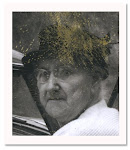
I continue to be fascinated by Rosa. Many different sides to this woman of mystery. Here she reminds me of silent screen star Theda Bara. There's something very theatrical about Rosa in her youth. She was stylish, and though not classically beautiful by today's narrow standards, she always looked mysterious and lovely. Add in a French accent and there's just so much to wonder about. Was her voice low and raspy, ever so sexy? Or did she have a dreadful high pitched "feminine" voice? I had a friend that had one of those. Didn't fit her body. She always sounded a bit like a chipmunk. I'm trying to imagine her now. Old with a baby voice. For some people it works, for others...
If you type in "Theda Bara" at Wikipedia one of the interesting references is to a French silent screen star named Musidora. I have to wonder how much Rosa was influenced, if at all, by Misidora.
Musidora (23 February 1889 – 11 December 1957) was the stage name of Jeanne Roques, a popular French silent film actress. She became famous for her vamp roles in such film serials as Les Vampires and Judex, in which she developed a persona comparable to that of Theda Bara. In addition to acting she directed and wrote many of her films.Born Jeanne Roques in Paris, France and raised by a feminist mother and socialist father, Musidora began her career in the arts at an early age, writing her first novel at the age of fifteen and acting on the stage with the likes of Colette, one of her life-long friends. During the very early years of French cinema Musidora began a professional collaboration with the highly successful French film director Louis Feuillade. But her first movie was Les miseres de l'aiguille, directed by Raphael Clamour in January 1914.Adopting the moniker of Musidora (Greek for "gift of the muses") and affecting a unique vamp persona that would be popularized in the United States of America by actress Theda Bara at about the same time, Musidora soon found a foothold in the nascent medium of moving pictures. With her heavily kohled dark eyes, somewhat sinister make-up, pale skin and exotic wardrobes, Musidora quickly became a highly popular and instantly recognizable presence of European cinema.StardomBeginning in 1915, Musidora began appearing in the hugely successful Feuillade-directed serials Les Vampires as Irma Vep (an anagram of "vampire"), a cabaret singer, opposite Édouard Mathé as crusading journalist, Philippe Guerande. Contrary to the title, the Les Vampires were not actually about vampires, but about a criminal gang cum secret society inspired by the exploits of the real-life Bonnot Gang. Vep, besides playing a leading role in the Vampires' crimes, also spends two episodes under the hypnotic control of Moreno, a rival criminal who makes her his lover and induces her to assassinate the Grand Vampire.The somewhat surreal series was an immediate success with French cinema-goers and ran in ten installments until 1916. After the Les Vampires serial, Musidora starred as 'Diana Monti' in another popular Feuillade serial, Judex opposite René Cresté, filmed in 1916 but delayed for release until 1917 because of the outbreak of World War I. Though not intended to be "avant-garde," Les Vampires and Judex have been lauded by critics as the birth of avant-garde cinema and cited by such renowned filmmakers as Fritz Lang and Luis Buñuel as being extremely influential in their desire to become directors.Other worksAs well as acting, Musidora became a film producer and director under the tutelage of her mentor, Louis Feuillade. Between the late 1910s and early 1920s, she directed ten films, all of which are lost with the exception of two: 1922's Soleil et Ombre and 1924's La Terre des Taureaux, both of which were filmed in Spain. In Italy, she produced and directed La Flamme Cachee based on the work of her friend, Colette. At a time when many women in the film industry were relegated to acting, Musidora achieved a degree of success as a producer and director.Later lifeAfter her career as an actress faded, she focused on writing and producing. Her last film was an homage to her mentor Feuillade entitled La Magique Image in 1950, which she both directed and starred in. Late in her life she would occasionally work in the ticket booth of the Cinematheque Francaise — few patrons realized that the old woman in the foyer might be starring in the film they were watching. Musidora died in Paris, France in 1957 and was laid to rest in the Cimetiere de Montmartre.Personal lifeMusidora married Dr. Clement Marot on April 20, 1927. The union lasted fifteen years and produced one child, Clement Marot Jr. The couple divorced in 1944.
So, do you think Rosa was an original or was she heavily influenced by what she saw on the flickering screen?



















Look at the eyes! Help!!
ReplyDeleteVampish!
ReplyDeleteI like to think that Rosa was an original and came about the theatrical looks naturally. She looks like she could have been a famous writer or political figure too.
ReplyDeleteBut she also looks as if she could have stepped right out of one of Edward Gorey's illustrations.
ReplyDeleteMaureen, you're right. There's just something about this shot. The way she's framed by the darkness, the expanse of lawn. Very mysterious.
ReplyDeleteChristine, I hadn't thought of it, but yes, there is some Edward Gorey going on. I can easily imagine her in one of his drawings.
She sounds fabulous and I love her name. So exotic looking as well.
ReplyDeletePsychedelicsister, I have more of Rosa that over time I'll be showing along with photos of her friends. Maybe it's better she remain a mystery. This way we can all imagine what she was like. Glad you liked her. I figured you would with what I've seen at your fun site.
ReplyDelete